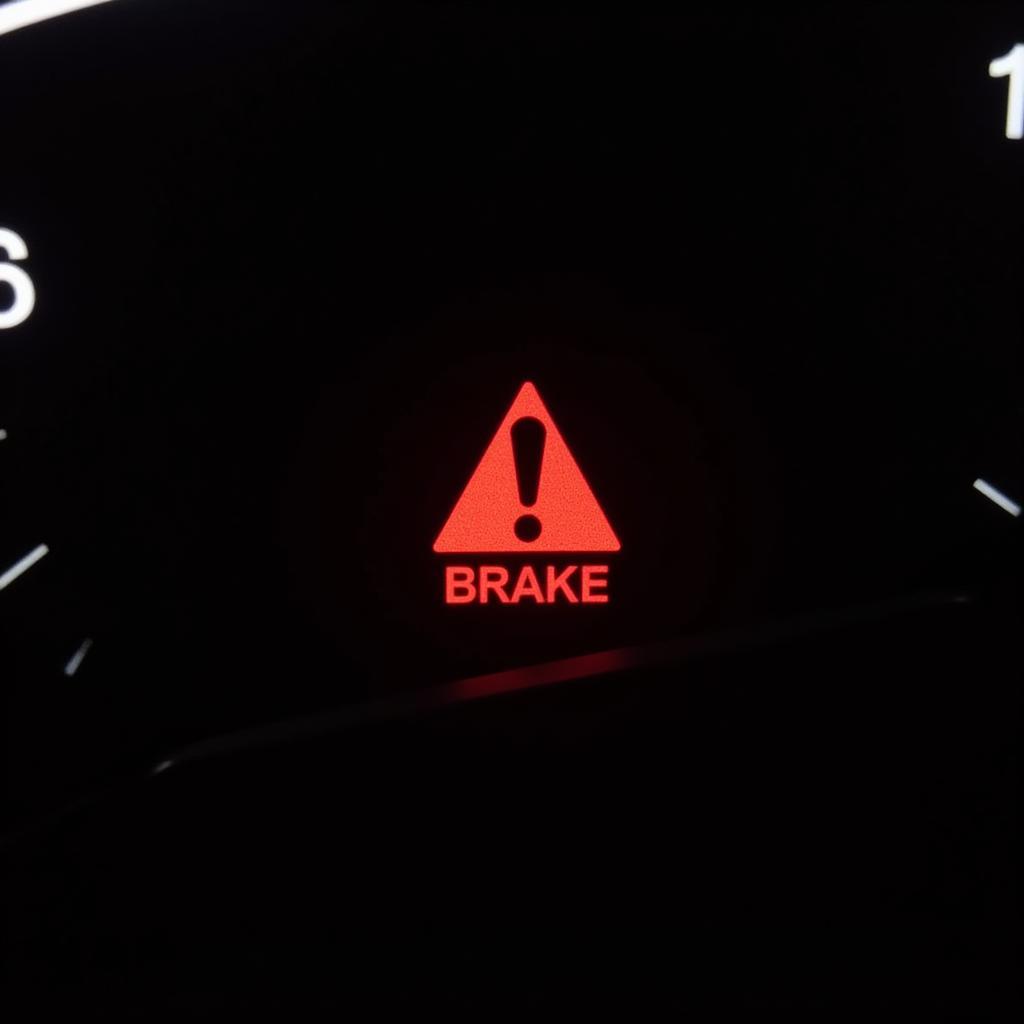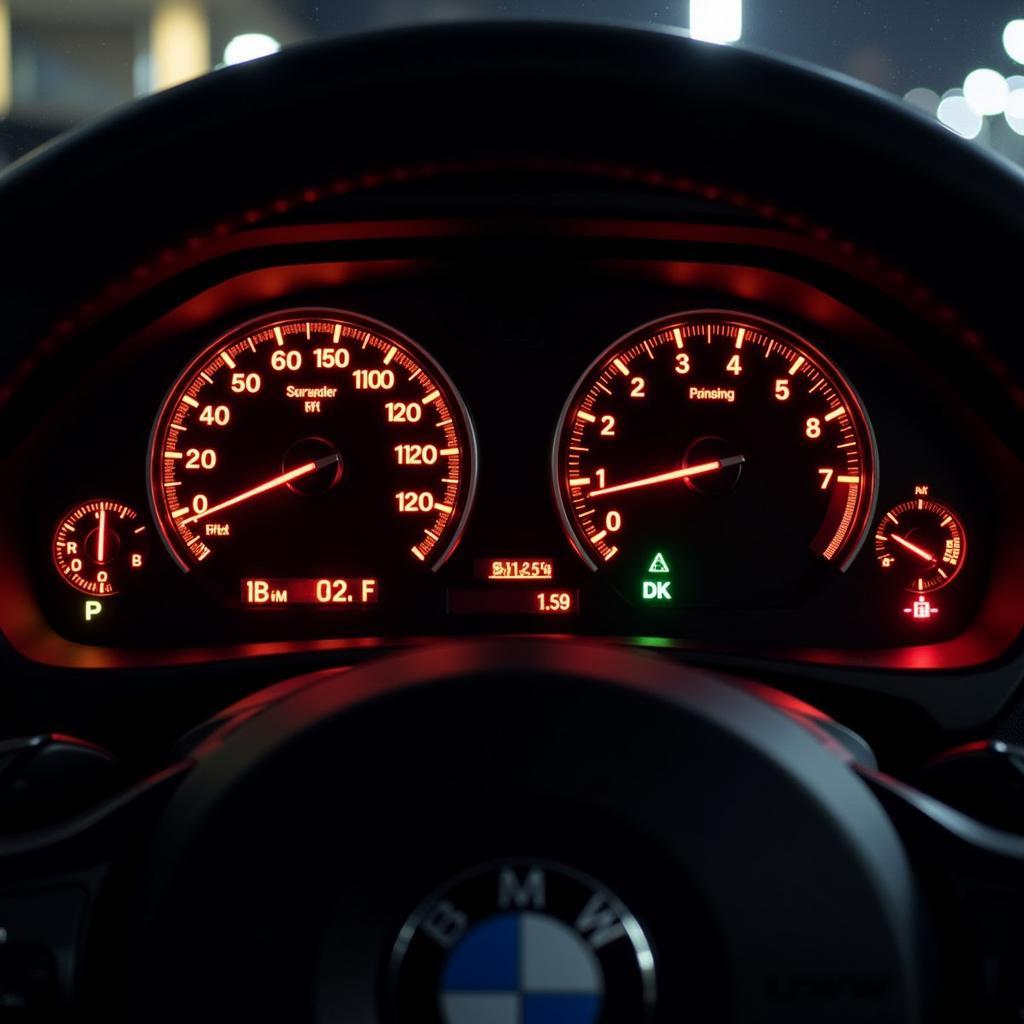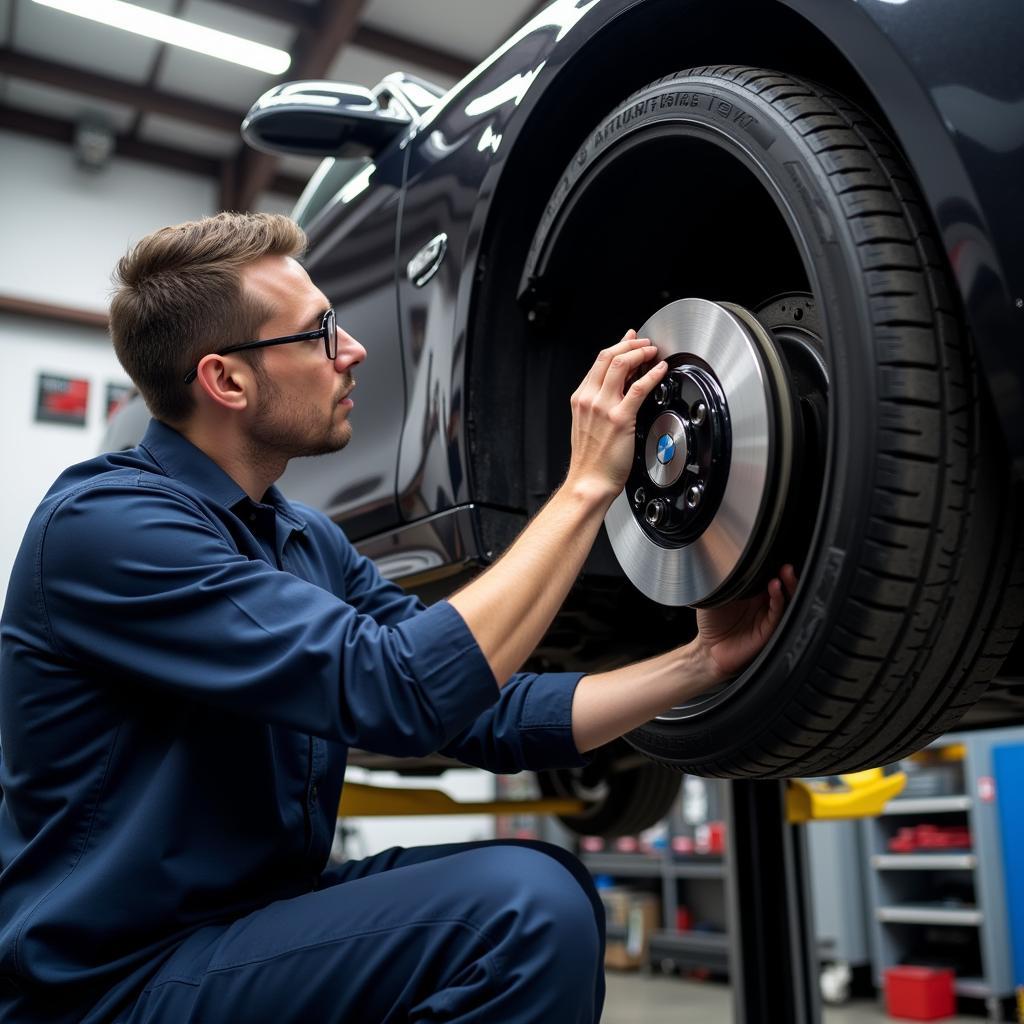When your BMW displays a brake warning light, it’s crucial to understand what it means and take appropriate action. These warning lights are your car’s way of communicating potential issues with your braking system, which is vital for your safety on the road. This comprehensive guide will delve into the various BMW brake warning lights, their meanings, and the steps you should take to address them.
Understanding BMW Brake Warning Light Symbols
BMWs utilize various warning lights to indicate different brake-related problems. Let’s break down the most common ones:
- Red Brake Warning Light: This light typically signals one of two critical issues. First, it could mean your parking brake is engaged. Before panicking, check if you’ve accidentally left it on. Secondly, it could indicate a serious problem with your brake system, such as low brake fluid. If the light stays on after disengaging the parking brake, it’s crucial to stop driving immediately and seek professional assistance.
 BMW Red Brake Warning Light
BMW Red Brake Warning Light
-
Yellow Brake Pad Wear Indicator Light: This light illuminates as a gentle reminder that your brake pads are wearing down and nearing the end of their lifespan. While not an immediate emergency, it’s crucial to schedule a brake pad replacement soon to prevent further damage and maintain optimal braking performance.
-
Amber ABS Warning Light: This light signifies a potential issue with your Anti-lock Braking System (ABS). Your car’s regular brakes should still function, but the ABS might not engage during emergency braking situations. It’s essential to have this inspected by a qualified technician to diagnose and rectify the problem.
-
BMW Brake Wear Warning Light: This specific warning light directly relates to the condition of your brake pads. When illuminated, it indicates that your brake pads have worn down beyond a safe limit, requiring immediate replacement. Continuing to drive with worn brake pads compromises your braking ability and can lead to costly damage to your rotors.
 Various BMW Brake Warning Lights on Dashboard
Various BMW Brake Warning Lights on Dashboard
Common Causes of BMW Brake Warning Lights
Several factors can trigger brake warning lights in your BMW:
- Worn Brake Pads: This is the most common culprit. Brake pads are designed to wear down over time.
- Low Brake Fluid: Brake fluid plays a critical role in transmitting force from your brake pedal to the wheels. A leak in the system can lead to low fluid levels and compromised braking.
- Faulty ABS Sensors: ABS sensors monitor wheel speed and help prevent wheel lockup during braking. Malfunctioning sensors can trigger the ABS warning light.
- Hydraulic System Issues: Problems within the brake lines, calipers, or master cylinder can also trigger warning lights.
What to Do When Your BMW Brake Warning Light Turns On
- Safety First: If you’re driving and a red brake warning light appears, safely pull over as soon as possible. Continuing to drive with a potentially serious brake issue puts you and others at risk.
- Check Your Parking Brake: Ensure your parking brake is fully disengaged. Sometimes, an accidentally engaged parking brake can trigger the warning light.
- Inspect Brake Fluid Level: If it’s safe to do so, carefully check the brake fluid level in the reservoir under the hood. Low brake fluid requires immediate attention.
- Contact a Qualified Mechanic: Whether you’re experiencing a red brake warning, an ABS warning, or even a brake pad wear indicator, it’s crucial to have your BMW inspected by a qualified technician. They possess the expertise and diagnostic tools to pinpoint the issue and recommend the necessary repairs.
dashboard warning lights brake wrench
Importance of Prompt Diagnosis and Repair
Ignoring brake warning lights can lead to:
- Complete Brake Failure: Driving with worn-out brake components significantly increases the risk of complete brake failure, leading to dangerous and potentially fatal accidents.
- Expensive Repairs: Addressing brake issues early can save you from costly repairs down the line. Neglecting minor problems can escalate into major ones, impacting other parts of your braking system.
 Mechanic Inspecting BMW Brakes
Mechanic Inspecting BMW Brakes
Tips for Maintaining Your BMW Brakes
- Adhere to Service Intervals: Follow BMW’s recommended brake inspection and maintenance schedule. Regular checks can help identify potential issues before they worsen.
- Avoid Aggressive Driving: Harsh braking and rapid acceleration put excessive strain on your brake system, leading to faster wear and tear.
- Listen for Unusual Noises: Pay attention to any unusual sounds like grinding, squealing, or scraping when applying the brakes, as these could indicate a problem.
Conclusion
Understanding your BMW’s brake warning lights is essential for safe and responsible driving. Addressing these warnings promptly and seeking professional assistance ensures the optimal performance of your braking system, keeping you safe on the road. By staying proactive with brake maintenance and heeding warning signs, you can enjoy many miles of confident driving in your BMW.
2011 bmw 328i warning light symbols brake
FAQs
Q1: Can I drive my BMW with the brake pad wear indicator light on?
While you can technically drive for a short distance, it’s crucial to schedule a brake pad replacement as soon as possible to avoid further damage and maintain safe braking.
Q2: What should I do if my BMW brake warning light comes on and then disappears?
Even if the light disappears, it’s essential to have your brakes inspected. Intermittent warning lights can indicate an underlying issue that needs attention.
Q3: How often should I replace my BMW brake fluid?
BMW typically recommends a brake fluid flush every 2-3 years or as specified in your owner’s manual. Regular fluid changes prevent corrosion and maintain optimal braking performance.
Q4: Is it safe to add brake fluid myself if the level is low?
While you can top off the brake fluid, it’s crucial to use the correct type and have a mechanic diagnose the cause of the low fluid level.
Q5: Does my BMW need specialized brake service?
BMWs often require specialized tools, diagnostic equipment, and expertise for brake repairs. It’s recommended to have your brakes serviced by a qualified BMW technician to ensure proper maintenance and repair.
